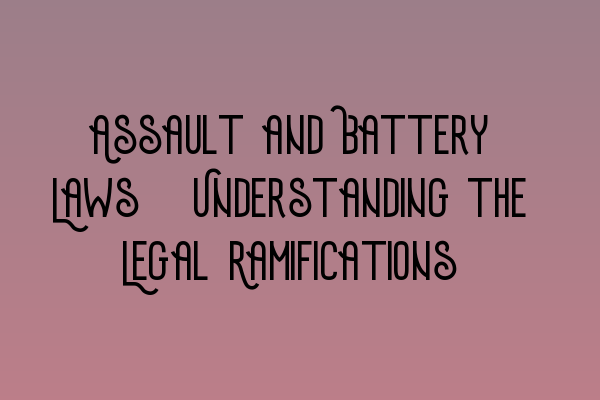Assault and Battery Laws: Understanding the Legal Ramifications
Assault and battery are serious offenses in the United Kingdom, and understanding the legal ramifications is essential. Whether you are a law student studying for the SQE Criminal Law & Practice exam or someone seeking general knowledge about assault and battery laws, this comprehensive guide will provide you with the necessary insights.
What is Assault and Battery?
Assault is the intentional act of causing reasonable apprehension of immediate harm or offensive contact to another person. On the other hand, battery involves the intentional and unlawful application of force or offensive contact upon another person without their consent. The two offenses often go hand in hand, but they can be charged separately.
In the context of criminal law, an assault charge is usually based on the accused’s intentional threatening behavior, while a battery charge requires actual physical contact.
Legal Consequences
Being convicted of assault and/or battery can have severe legal ramifications. The penalties for these offenses vary depending on the jurisdiction and the severity of the incident. In some cases, they can be tried as summary offenses, while in others, they may be deemed as more serious and treated as indictable offenses.
If found guilty, the consequences may include fines, probation, community service, restraining orders, and even imprisonment. It’s important to note that the severity of the punishment can increase if the assault or battery was committed against a vulnerable individual, such as a child, an elderly person, or a police officer.
Defenses to Assault and Battery Charges
When facing assault and battery charges, it’s crucial to explore available defenses. These defenses may vary depending on the circumstances surrounding the case, but some common ones include:
- Self-defense: If the accused can prove that they acted to protect themselves from immediate harm or danger, they may be able to establish a valid self-defense claim.
- Consent: In certain situations, consent can serve as a defense. For example, in sports or other activities where physical contact is expected and consented to, a battery charge may not be valid.
- Mistaken identity: If the accused can demonstrate mistaken identity or a lack of intent, it may cast reasonable doubt on their involvement in the offense.
It’s important to consult with a criminal defense solicitor to determine the most viable defense strategy based on the specific circumstances of the case.
Preparing for the SQE Criminal Law & Practice Exam
If you are preparing for the SQE Criminal Law & Practice exam, understanding assault and battery laws is crucial. Familiarizing yourself with relevant case law, statutes, and legal principles will help you navigate questions related to these offenses.
To enhance your preparation, consider utilizing resources such as SQE 1 Practice Exam Questions and SQE 1 Practice Mocks FLK1 FLK2. These resources provide comprehensive practice materials designed to test your knowledge and help you identify areas for improvement.
Further SQE Exam Preparation
When preparing for the SQE Criminal Law & Practice exam, it’s essential to cover all necessary topics. In addition to assault and battery laws, other areas you should focus on include criminal procedure, evidence, sentencing, and appeals. Utilizing SQE 2 Preparation Courses and SQE 1 Preparation Courses will give you access to expert guidance and study materials to optimize your exam performance.
Stay Informed About SRA SQE Exam Dates
If you are planning to take the SRA SQE exam, staying informed about key dates is essential. Visit the official SRA website or check out SRA SQE Exam Dates for the latest information regarding application deadlines, exam schedules, and result announcements.
Conclusion
Assault and battery charges carry significant legal ramifications. Understanding the nuances of these offenses, potential defenses, and preparing adequately for the SQE Criminal Law & Practice exam are essential steps towards building a strong foundation of knowledge in criminal law. Remember to rely on trusted resources, such as SQE 1 Practice Exam Questions and SQE 1 Practice Mocks FLK1 FLK2, to enhance your understanding and improve your chances of success.
